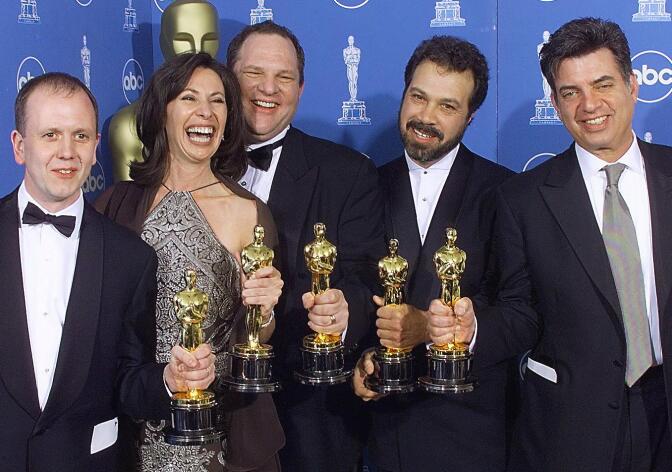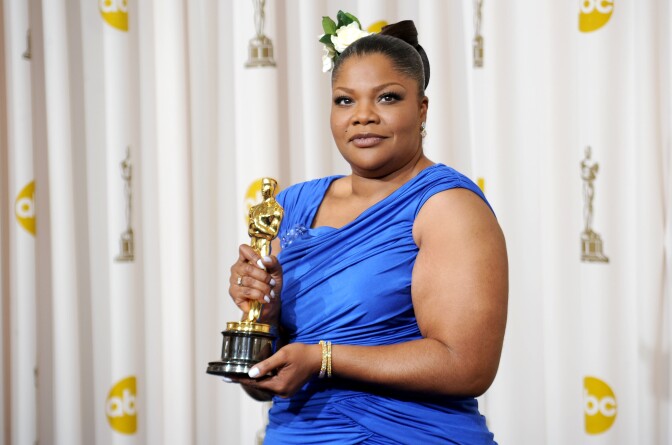This story is free to read because readers choose to support LAist. If you find value in independent local reporting, make a donation to power our newsroom today.
Oscars Past: 1999, The Year 'Shakespeare In Love' Campaigned Its Way To The Top

The Academy Awards are coming up this weekend, and contenders have been campaigning hard. “For Your Consideration” billboards line Sunset Boulevard, actors have made the press rounds and ads have appeared in trade publications.
About this story
On the eve of the 95th Academy Awards this Sunday, March 12, in Hollywood, we're looking back at some of the most exciting moments in the history of the Oscars and how they relate to U.S. history.
We examined these important turning points in the first season of our podcast The Academy Museum Podcast hosted by Jacqueline Stewart, now the Academy Museum of Motion Pictures director and president.
The practice of filmmakers promoting their work around awards season has been in place since at least the 1930s, but it wasn’t until 1999 that it became as cutthroat as it is today.
That year, the now-disgraced producer Harvey Weinstein launched the most aggressive campaign Hollywood had ever seen, seeking wins for Shakespeare in Love, a critically acclaimed romantic period piece dramedy starring Gwyneth Paltrow and Joseph Fiennes.
Weinstein’s tactics, and the tactics of those he enticed to work on the film’s behalf, changed the entire Oscars game.
The big upset

In the months leading up to the 1999 awards show, most Hollywood insiders expected Saving Private Ryan, directed by Steven Spielberg and starring Tom Hanks, to sweep the ceremony.
“[Saving Private Ryan] was a kind of tribute to the greatest generation,” said Scott Feinberg, a veteran awards columnist for the Hollywood Reporter. “[It was] this very violent, very moving, very real tribute to American heroes from World War II … there was sort of a sense, even though it was the middle of the year, that, 'How can anything come along that could possibly compete with that?'”
But when the moment arrived, it was an upset. Harrison Ford walked onto the stage at the Dorothy Chandler Pavilion with an envelope in his hand, and announced that Shakespeare in Love had won Best Picture.
“There were gasps in the room,” said Feinberg. “A lot of shock.”
Listen to the episode
A $5 million campaign
Miramax, Weinstein’s production company, had spent $5 million on the film’s Oscar campaign.

It wasn’t the first time nominees campaigned — In 1930, Mary Pickford held a catered lunch at her home to campaign for Best Actress in her first sound film, Coquette, and the 1956 film Marty employed what we would now call PR stunts, such as hiring models to hold promotional signs — but it was the aggressiveness of Miramax’s 1999 effort that broke the mold.
“Miramax was the first to set up private screenings over holiday breaks for academy members in Aspen and all sorts of places where many academy members vacation,” said Feinberg. “You got the first lady of the United States to come to your premiere, which Hillary Clinton did.”
It was also the first time any company hired an in-house publicist specifically devoted to awards campaigning.
Donna Gigliotti, one of the award-winning producers of Shakespeare in Love, recalls being asked to compose 300 hand-written invitations to the film’s L.A. and New York premieres.
“They pushed a list [of academy voters] across the conference table at me and said, ‘Here, why don't you just highlight everybody that you know,’” said Gigliotti. “Then they said, ‘Now you should write personal notes to all 300 people that you highlighted.’”
Gigliotti went along with it, although somewhat begrudgingly, and now believes that simply getting those voters’ eyes on the film played a big part in helping it win.
“At the L.A. screening, there were so many people that were so kind afterwards to say, ‘Thank you for inviting me. I so loved the movie. I enjoyed it. I'm going to vote for it,’” she said.
The precedent is set
After the 1999 awards, there was no going back. Other movie studios understood they would have to match or go beyond what Miramax had done to remain competitive. Dreamworks, which produced Saving Private Ryan, took the message very much to heart.
“For the next three years, Dreamworks was the one who went all out, and had a hand in the next three Best Picture Oscar winners,” said Feinberg. “You had American Beauty, Gladiator and A Beautiful Mind. So they obviously learned something from this too.”
Part of the reason filmmakers were so hungry for wins was the changing distribution model of Hollywood movies. As VHS turned into DVDs, listing a film’s awards on its packaging resulted in better sales.
It became more and more commonplace for studios to hire teams of publicists and consultants specifically for awards campaigning, especially as the folks who ran campaigns at Miramax moved on.

Mo'Nique's refusal
But the change wasn’t without its price. As part of awards campaigns, actors are asked to make press appearances, host screenings and generally make nice with academy voters. It takes them away from other projects, and can come at a cost to their personal life.
The actor Mo’Nique found this out the hard way. After being nominated for her role in the 2009 film Precious as abusive mother Mary Lee Johnston, she was asked to ingratiate herself to academy voters not just by doing press, but by things like cooking breakfast for committee members and schmoozing with them.
She refused.
“I was like, ‘Wait, hold up,’” she said. “I had babies, I was still a newlywed, I was doing a talk show, I was on a comedy tour. I had to prioritize my life. See, I had an older son that, I wasn't there all the time because I was doing it the way everybody told me to do it. And now, that son being 31 years old, we still have a strain in that relationship because of all the time lost. So people never understood the deepness of the position I was taking.”
It is about that performance. That's what the academy was saying when they called my name.
The specific asks — and the reactions she received for refusing to comply — also felt racist.
“They just looked at me, said, ‘You are a fat Black woman, you should just be glad you coming to the party, and you're not willing to go out here and ask these people to please like you and please vote for you?’” she said. “The performance is on the screen. Y'all are making this now personal. I don't need to have a personal relationship with any of these people. Do they need to have one with me? They're judging the performance.”
Mo’Nique was paid $50,000 for her performance in the film. Any additional costs incurred from campaigning would have been her responsibility to cover.
And despite declining to participate in campaigns, on Oscars night, she won anyway.
“The academy did prove it's not about the politics,” she said. “It is about that performance. That's what the academy was saying when they called my name.”
About the podcast episode that inspired this story
This episode was written and produced by Victoria Alejandro and edited by Antonia Cereijido.







